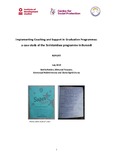Implementing Coaching and Support in Graduation Programmes: a case study of the Terintambwe programme in Burundi

Download
Date
2019-07Author
Roelen, Keetie
Yusupov, Dilmurad
Nshimirimana, Emmanuel
Uruna, Gloria Sigrid
Metadata
Show full item recordImpact
Abstract
Graduation model programmes represent a relatively new but well-established type of anti-poverty programming. First designed and implemented in Bangladesh, they are now operational in more than 40 countries across the globe (Arévalo, Kaffenberger, and de Montesquiou 2018). A comprehensive and carefully sequenced package of material transfers, access to financial services and training and coaching has proven successful in reducing poverty, increasing consumption and asset holdings and improving food security, with many benefits being maintained at least in the first year after programme end (Banerjee et al. 2015).
The component of coaching and support is sometimes dubbed the ‘X-factor’ within graduation programming in reference to its unique contribution in affecting positive change over and above material support. Previous research on the Concern Worldwide Terintambwe programme in Burundi has found that the combination of economic support, training and coaching mutually reinforce their respective impacts and that this leads to greater overall change (Roelen and Devereux 2018). These findings fit wider literature on behaviour change strategies, including behaviour change communication (BCC), which aim to promote positive behaviours and curtail potentially damaging ones (Mayne et al. 2018), and add to an emerging evidence base that consider the combined impact of material support and BCC (Ahmed et al. 2016).
Nevertheless, the intricacies of implementing coaching and support services within graduation programmes are relatively poorly understood, with little research zooming in on the role of frontline workers that deliver such services. Questions about dosage (e.g. frequency and duration of interactions with frontline workers) and delivery modalities (e.g. face-to-face versus digital engagement, standardised versus tailored support) are commonplace in discussions about advancing graduation programming, not least because of the high cost associated with implementation of this component.
This research aims to contribute to the general knowledge base and to provide practical insights regarding implementation of graduation programmes, seeking to offer input into the development of a feasible, affordable and effective model for coaching and support within such programmes. It does so on the basis of on an in-depth study of implementation of coaching and support services within Concern Worldwide’s Terintambwe Graduation Model programme in Burundi. This programme offers a particularly pertinent case study as the research takes place against the backdrop of a change in the coaching and support model. While such services within the first rounds of the programme were provided by Concern Worldwide case managers, it is now provided by government community workers (Community Development Agents – CDAs). CDAs have strong local presence as they are recruited from the communes that they work in but they receive lower pay and may have lower qualifications than Concern Worldwide case managers.
Citation
Roelen, K.; Yusupov, D.; Nshimirimana, E. and Uruna, G.S. (2019) Implementing Coaching and Support in Graduation Programmes: a case study of the Terintambwe programme in Burundi, Brighton: Institute of Development StudiesRights holder
Institute of Development StudiesRights details
https://www.ids.ac.uk/wp-content/uploads/2018/12/IDSOpenDocsStandardTermsOfUse2018.pdfCollections
- IDS Research [1671]
